You think you know who you are...until you go abroad!! - BCA Quito - University of San Francisco de Quito Past Review
By malinda.britt (Bridgewater College) - abroad from 07/21/2012 to 12/19/2012 with
Ecuador Study Abroad Reflections: Comprehensive Reviews of Past Programs
I had never been abroad (never even been in a plane!) until I went to Ecuador. That being said, the BCA program in Quito was the perfect program for me because it was structured enough that I didn't feel like I was just being left in another country to fend for myself. Yet being in the program didn't hinder me at all from exploring on my own and even pushed me to get outside of my comfort zone, which as a result made me much more confident and independent. The BCA program requires its students to do an end of the year "creative journal project". This is a great way to capture what each student learned throughout the semester and to be able to present it in a unique and personal way. I wrote a book about the people I had encountered throughout the semester, and the impact that had on me. The best way I can explain what I gained most from my semester abroad is by sharing the preface I wrote for the book.... "I have met many different individuals during my study abroad experience in Ecuador. This book is really in honor of the many people whose faces who are not pictured…the people I have met on the buses (the hotel environmentalist Santiago, the guitarist, the teacher María, the proud mother and her newborn, the flirtatious high schooler, the bartender, just to name a few…), the people I pass everyday on the street but whose names I will still never know, the countless taxi drivers (some who have entertained me and those who have swindled me), the waiters and waitresses at restaurants I have discovered here (Nicholas from Romolo e Remo, you are beautiful and I will never forget you!), the little girl on the night bus on the way back from Cuenca, who quizzed Emiliano and I on how to translate the names of different body parts into English, the middle-aged couple that took walks in the park while I did my early morning runs, the students in my university classes, the hostel owners eager to give us lodging, the dogs I passed each morning on my way to the bus station, the Texan who loves old karate sitcoms and vegetarian food, the German passerbys trying to find some good waves in Canoa, the couple from Rio Muchacho and the coordinator Kevin whom we all adore, the artisan guitar/flute maker and his family, the community members from South Quito we spent an afternoon getting to know, the tour guides from our many BCA expeditions, the little kids who helped us build a fire one cold night on an andinismo trip, the members of the Mennonite church I met one Sunday morning, the Swiss mountaineer (an old friend of the ecuafamily), the friends of friends, the good the bad and the too soon to tell …all the people who I have encountered here but who can only remain in my memory. And then there are the people who you will see in this book, some whom I have come to know better than others. I think God places a lot of people in our lives but we don’t always make the effort to get to know them. We meet people by chance but really we make that chance worthwhile when we take the time (even if it’s only 5 minutes) to find out who they are. Sometimes we only meet them once, and sometimes they circle back again (and again) to become a part of our life experience. Yet too often we avert our eyes, pull out our cellphones, and live in the bubble of relationships we have created for ourselves. There is so much variety and vibrancy of humanity in this world waiting to be unearthed, if only we take the chance to encounter it." I guarantee that you will meet some amazing people if you study abroad. I met many characters in Ecuador, those that inspired me and those that challenged me and tested my limits, and it was through those relationships that left me feel changed for the better by the end of the semester.
Review Photos
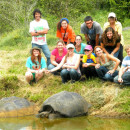
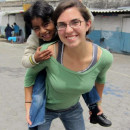
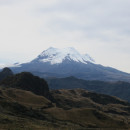
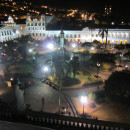
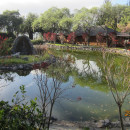
Personal Information
| How much international exposure did you have prior to this program? | None |
Review Your Program
|
* Overall educational experience
Academic rigor, intensity, resources, etc. |
My best educational experiences were actually found outside of the University. I learned so much from just living in the language through my day-to-day interactions with my host-family and through my internship at a non-profit organization CENIT in Quito. However, although I feel that I personally learned more outside of the classroom, the University of San Francisco offers a wide variety of courses that accommodate students with varying levels of Spanish proficiency. |
|
* Host Country Program Administration
On-site administration of your program |
The BCA Quito administration was wonderful! Daniel Bryan, the head coordinator, has done amazing things for this program. His connections with other organizations and people in Quito makes program excursions very unique and authentic, allowing students to have the fullest of cultural experiences. Martha Perez, the assistant director, was essentially our step-in mom during the semester, who took care of any conflicts within our host family situations and was very attentive to all of the BCA students' needs. Lastly, Miguel Andres Guerra was our other assistant director, and was largely in charge of coordinating student internships and volunteer opportunities. He was an invaluable resource to the BCA students in this respect. Although not all of these hard-working individuals will be returning to the program site next year, you can be sure that their legacy will leave a very well organized program that will continue to give students an amazing study abroad experience. |
|
* Housing:
How satisfied were you with your living arrangements? |
I loved my host-family! I lived with my "ecuamom" on the second floor of a house, but also enjoyed the company of my extended family who lived in the rest of the house (aunt/uncle, cousins and second cousins, another international student, and our two dogs!). I had my own room and bathroom, which gave me all of the privacy I needed, but what was even better was being able to live with so many family members - it was a very warm, fun, and comforting environment. My Spanish also improved immensely through my daily interactions with the family. |
| * Food: |
Admittedly, I was disappointed at first with Ecuadorian cuisine. I am a person who delights in spicy, flavorful foods...anything that packs a punch! I would describe Ecuadorian food as having a more humble, earthy flavor. You will eat LOTS of rice. However, the variety of produce South America offers is truly incredible. I ate so many interesting (and delicious!) fruits while in Ecuador! And with that comes "batidos", delicious fruit juices! My favorite culinary experience while in Ecuador was eating "ceviche," a favorite coastal soup we would eat at the beach (think gazpacho with shrimp!). Lastly, the food prices in Ecuador are phenomenally low, making it an excellent option for college students on a budget. One of the definite advantages about being in the BCA program is that they use part of your tuition that you pay to your home university for a "food allowance" which more than covers your lunch meals/snacks all semester. |
|
* Social & Cultural Integration:
How integrated did you feel with the local culture? |
I felt very well integrated in the culture here. This was largely due to my time spent with my host-family, my classes at the University, and my internship. However, something I think that is most special about the BCA program is its commitment to the social and cultural integration of its students. Our group excursions allowed us to have encounters with the realest of people...local artisans, environmental activists, musicians, restaurant and hostel owners, Amazonian researchers...just to name a few! |
|
* Health Care:
How well were health issues addressed during the program? |
I was very fortunate while in Ecuador in that I encountered minimal health concerns. BCA's health section of the pre-semester orientation was super helpful for the students (what foods to avoid, diarrhea is normal and even expected at the beginning, who to contact if you get sick or hurt, etc.). There is a health clinic at the university that is available to students' needs. This clinic is also specially helpful for getting necessary shots for certain excursions (safe and far less expensive than in the States!), such as the yellow fever shot for students wishing to visit the Tiputini Biodiversity Station in the Amazon. As far as the local health care system goes, I had one trip to emergency care due to an extreme eye irritation, and was impressed with the care I received...fast, professional, and INEXPENSIVE. However, I hear that this can vary depending on the hospital. |
| * Safety: |
Like any large city, Quito has definite safety risks. These risks, however, are minimalized thanks to a safety orientation with the BCA directors following students' arrival. Students are advised not to be out past 7PM in certain areas and are instructed upon how to ride public transportation and avoid petty theft/other violence. Due to the machismo present in Ecuador, female students are also given safety advice in regards to how to respond to catcalls and other uncomfortable situations. Food safety should not be a serious concern for prospective students to the program, as host-families are specifically instructed how to prepare food/water so that it is safe for students to eat and drink. |
| If you could do it all over again would you choose the same program? |
Yes
|
Finances
|
* Money: How easily were you able to live on a student's budget?
(1 = not very easy/$200+ on food & personal expenses/week, 2.5 = $100/week, 5 = very easily/minimal cost) |
It was very easy for me to live on a student's budget. Traveling around Ecuador is very economical...transportation, lodging, and food are all pretty cheap. You could have an awesome weekend trip for less than $30! The BCA program gives each student an allowance (comes out of tuition/program costs) at the beginning of each month. One part of the allowance is for lunch (approximately $120, more than enough!) and the other part is for transportation needs, usually to and from school (approximately $20). These are what the allowances are designated for, however students often find that they do not need all of the allowance to cover these expenses, and will often use the allowance for other personal costs (travel, souvenirs, etc.). The BCA program also reimburses students for "cultural experiences" up to a certain amount (museums, concerts, a soccer game, etc.) |
| Not including program expenses, about how much money did you spend on food and other expenses each week? | On average, I spent less than $15 per week. |
| Do you have any general money-saving tips for future study abroad participants? | As you prepare to study abroad, definitely save up beforehand. It's really nice to have the freedom to do fun things on trips that cost extra money, and even just saving up the semester beforehand by not splurging on coffee or eating out can allow you to do so much more abroad. Especially in Ecuador where so many things are cheaper and the dollar is worth more. |
Language
| * Did your program have a foreign language component? | Yes |
|
How much did the program encourage you to use the language?
0 = No encouragement, 5 = frequent encouragement to use the language |
The BCA program encourages its students to speak Spanish, especially through the opportunity offered to students to take a "Spanish pledge". Fall semester students are also required to take a pre-semester Spanish and culture course for three weeks before beginning classes in August. |
| How would you rate your language skills at the beginning of the program? | Advanced |
| How would you rate your language skills at the end of the program? | Fluent |
| What was the highest level language course you had completed prior to departure? | I took a few 300 level Spanish courses before leaving for Quito. |
| How many hours per day did you use the language? | 10+ |
| Do you have any tips/advice on the best ways to practice the language for future study abroad participants? | It's hard at first to talk in Spanish all the time, but the more you practice it, the easier it will come. It's not hard to fall back on English while in Ecuador, especially while conversing with other BCA program students, but you will improve so much more in Spanish by limiting your English. I would definitely recommend taking a Spanish pledge. If you're shy about speaking, start with your host-family. They love helping you practice and you will become closer through the conversations you'll have together, mistakes and all! |
Other Program Information
|
* Where did you live?
Select all that apply |
|
|
* Who did you live with?
Select all that apply |
|
|
* Who did you take classes with?
Select all that apply |
|
| About how many local friends did you make that you will likely keep in touch with? |
A Look Back
| * What did you like most about the program? |
|
| * What could be improved? |
|
| * What do you know now that you wish you knew before going on this program? | I wish I had known how awesome BCA Quito was going to be so that I could have planned to stay for a year instead of a semester. After a couple months in Ecuador I found myself interested in continuing to study in Quito the following spring semester, and unfortunately this was simply not possible to coordinate with my home university at that point. |
Individual Course Reviews
| Course Name/Rating: |
Communications and Art: Gender and Race studies |
| Course Department: | Communications |
| Instructor: | Santiago Castellanos |
| Instruction Language: | Spanish |
| Comments: | This was an excellent course. Santiago is a very well-informed professor who invites students to engage with class material outside of the classroom through cultural events, often sponsored or hosted by the FLACSO (Faculty of Latin American Social Sciences). This class would not be recommended for someone with low Spanish proficiency, as it requires the student to read challenging material (in Spanish) and engage in classroom discussions with Ecuadorian students. I would definitely recommend this class to students majoring in the social sciences, especially if there is interest in racial or gender studies (I am a sociology major with a cultural studies minor). |
| Credit Transfer Issues: |
| Course Name/Rating: |
Tejido (Basic Weaving) |
| Course Department: | Art |
| Instructor: | Mariola Kwasek |
| Instruction Language: | Spanish |
| Comments: | This laid-back course was great for students who needed a break from other rigorous courses. It gave me time in my school schedule to reflect and just focus on my thoughts (and my weaving project) for a bit. Mariola is a fun, quirky personality and is very good with international students...and her weaving projects are incredible to look at! |
| Credit Transfer Issues: |
| Course Name/Rating: |
Andinismo (Mountain Trekking) |
| Course Department: | Physical Education |
| Instructor: | Diego Nunez |
| Instruction Language: | Spanglish |
| Comments: | This was a really fun course, and is great for students interested in hiking, backpacking, or mountain climbing. Students are required to go on three excursions in order to pass the class...but trust me, you won't be able to choose between the trips offered each weekend, you'll just want to do them all! I saw so many spectacular sites. This class was also a really great way to get to know local university students. Diego Nunez, the main instructor, is very good about pushing everyone to speak in Spanish, but he can speak in English well enough to keep everyone on the same page too. All of the instructors are very experienced and will teach you all the "ropes". Students interested in this class should consider purchasing boots/hiking/backpacking equipment prior to coming to Quito, because these items are often imported and more expensive in Ecuador than in the States. |
| Credit Transfer Issues: | The credit for this class did not transfer to my home university. |








